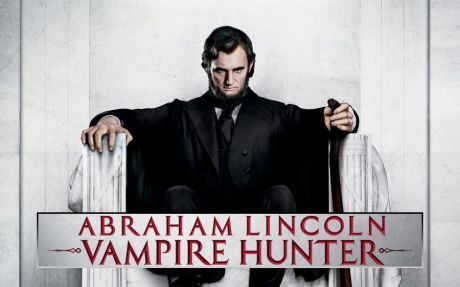Arts
You are here
Lincoln As Vampire Hunter Proves More Realistic Than Harper

July 4, 2012
Abraham Lincoln, Vampire Hunter is not what you would call accurate historical fiction. But the truly depressing thing is that you’ll learn more about 19th century North American history from it than you will from Stephen Harper’s jingoist campaign to promote the two hundredth anniversary of the War of 1812.
At least the events portrayed in the Lincoln movie are theoretically possible—once you set aside any disbelief you might have regarding the existence of vampires.
The movie is basically a thinly disguised allegory in which slave owners are equivalent to—and in many cases are—vampires. Here the American Civil War is about both abolishing slavery and ensuring the United States will be ruled by the living. The Civil War was about more than slavery, and the film does an adequate job of emphasizing this as well. It does not discuss the economic motives for the war, which were largely about forcing the southern states into a more industrial model. For their part, the southern states were focussed on preserving economic and political autonomy from the Union, and this fact, too, is portrayed fairly well in Vampire Hunter.
The film also gives American Blacks a central role in their own defence, a characteristic often woefully lacking in any depiction if this war. The role is mainly about getting silver ammunition to the Union army to kill the Confederate vampires, but hey, who’s quibbling.
In contrast, Stephen Harper’s War of 1812 bears almost no resemblance to actual events, and certainly does not even try to include experiences of the marginalized.
In the theatre to see the Lincoln movie, we were treated to a trailer for the Government of Canada website www.1812.gc.ca. The trailer promoted those great buddies, Brock, Tecumseh, Secord, and de Salaberry. In reality, only Tecumseh and Brock were acquainted during the war, and the life of Tecumseh is much more important for his resistance to the sell-off of indigenous land and his attempts to coordinate resistance among First Nations than it is for his role in the war against the US.
The government web site contains several gems of historical distortion in a message from Harper that claims that “the War of 1812 was a seminal event in the making of our great country” and that those who fought in it were “heroes who fought for Canada” to “save Canada from American invasion” –at a time when Canada did not exist. Harper emphasizes the “long and proud military history in Canada” that began during that war, because his main objective is to promote the militarization of Canada.
While the website also states that some public servants are trying hard to make the site valuable as a public education tool, it still relies on what is essentially “great man” history to tell the story. It does this by neglecting huge aspects of the experience of aboriginal people, as well as settlers, caught in the cross fire and forced into fleeing as refugees.
As Jamie Swift and Ian McKay (co-authors of Warrior Nation: Rebranding Canada in an Age of Anxiety (Between the Lines, 2012) recently wrote, “Stephen Harper has decided to commemorate the War of 1812 with a $28 million heritage extravaganza, selling what Pierre Berton called a “bloody and senseless conflict” to the citizenry for the simple reason that it was a war.” Perhaps not more can be said about Abraham Lincoln: Vampire Hunter; but at least, as well as being entertaining, it bears a passing resemblance to historical fact.
Section:
Topics:
- Log in to post comments










